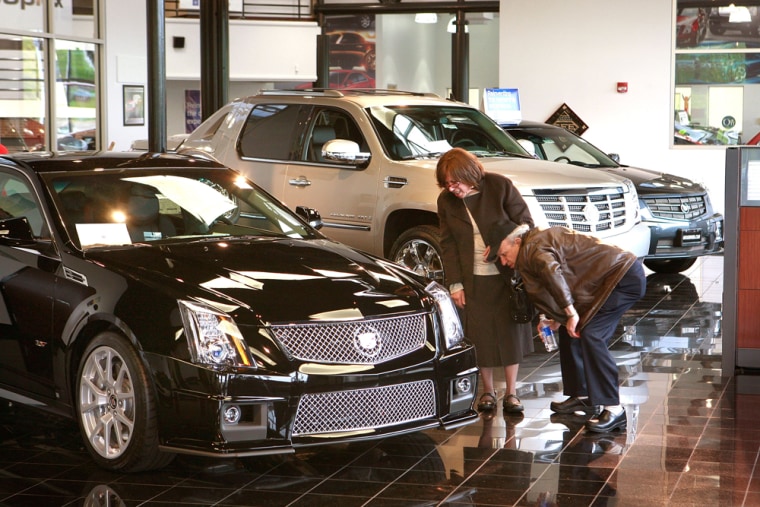After a long hiatus, American consumers appear ready to return to auto showrooms to buy new cars, experts say, although not in the large numbers seen in past years.
A rise in new U.S. car sales in coming months would be a welcome development for the nation’s automobile industry. A nasty recession has decimated sales to less than 10 million vehicles a year — a drop of more than 40 percent from past years — and helped force General Motors Corp. and Chrysler LLC to file for Chapter 11 bankruptcy protection.
May sales data appeared to confirm a bottoming in the U.S. car market, however. On Tuesday, Ford Motor Co. reported a 24 percent drop in U.S. sales for May, but sales were up 20 percent from April. GM's sales in May fell 30 percent versus a year ago, but were up 11 percent from April.
“We’re off the bottom,” said auto industry analyst Ken Elias, partner with Maryann Keller & Associates in Scottsdale, Ariz. “People will want new cars because many have deferred purchasing a car since last fall. We think it’s positive for U.S. automakers.”
To be sure, consumers still face strong economic headwinds that could quell new car purchases, including rising unemployment, rising home foreclosures, and continued stinginess among banks and other financial institutions over lending money.
That said, experts are optimistic about stronger new car sales on the horizon. They point to:
- Renewed consumer confidence about the economy.
- Signs that the overall economy may be bottoming out.
- The recent surge in stock markets.
- A greater willingness by banks and other financial institutions to lend consumers money.
- Pent-up demand for new car purchases.
- “Fire sale” prices by car dealers who are going out of business.
“There are more people looking at and seriously researching new car purchases,” said Karl Brauer, editor in chief at Edmunds.com, the car-information Web site. “There’s a sense among a lot of people that we’ve hit bottom and the economy will be coming back.”
Renewed buying interest will likely come gradually and shoppers will likely favor smaller vehicles than in the past, especially if gasoline prices creep back toward $4 a gallon.
Brauer noted that increased traffic on the Edmunds.com Web site typically signals an increase in car sales 30 to 90 days down the road. Among other things, Brauer singled out strong interest among people who are going to the Edmunds.com site to learn more about buying a new car.
“The good news is that retail demand has seemed to stabilize over the last quarter,” said Alan Baum, director of research and analysis at The Planning Edge in Birmingham, Mich. “There’s clearly a lot of pent-up demand.”
The annual rate of car sales in the United States so far this year has averaged less than 10 million units vs. 13.2 million for all of 2008. Analysts say a rate of less than 10 million annually is unusually low and unsustainable.
“This year we could easily be around the 10 million mark, give or take,” said Edmunds.com’s Brauer, though he added that sales could reach as high as 12 million. “You could see a pretty strong surge back into the showroom because sales have been so low and people haven’t been buying for so long.”
But Gary Dilts, senior vice president for global automotive at J.D. Power and Associates, cautioned that easier credit is key to any sales recovery. He said there's only been a "slight improvement" so far in credit availability.
"Credit is the big killer here. If the credit door doesn't open, nothing is going to change," said Dilts. "We've got people coming to the showrooms in much greater numbers than the sales data show. The problem is they can't get through the credit door."
An unexpectedly strong rebound in sales this year to 12 million would still be a far cry from the sales levels that carmakers enjoyed in recent years. Average U.S. sales neared 17 million a year this decade through 2007. Experts say it will be years before car sales approach those levels.
Instead, experts predict over the next few years the more “normal” annual sales rate will range from 12 million to 15 million.
Various factors are expected to temper sales.
Car-rental agencies are maintaining smaller fleets and holding onto the cars they have in their lots for longer periods. Also, consumers are expected to be less likely than before to bankroll a car purchase by tapping such resources as a home-equity loan, given the recession and lower home prices.
For now, consumers who are buying cars are favoring a variety of models, not just small, fuel-efficient vehicles, whose sales have taken a hit after the drop in gasoline prices.
Brian Gluckman, spokesman for online auto shopping site AutoTrader.com, said midsize family sedans remain a perennial favorite, including the Honda Accord and Toyota Camry. “We also see good traffic on our site for the Nissan Altima,” he said.
Crossover vehicles, which have the look and height of a sport utility vehicle but sport a chassis and drivetrain more similar to a car, also are selling.
“Honda’s CR-V is the best-selling such vehicle, with the Toyota RAV4 and Ford Escape coming close behind,” Gluckman said. “The new Chevrolet Camaro has struck a chord with consumers, because in the end, it's a hot car with great design. Another winner is the Kia Soul.”
With gasoline prices back below $4 a gallon, consumers are again buying big pickups and larger SUVs but in fewer numbers than previously.
And looking ahead sales of such vehicles are unlikely to reach past levels, particularly now that the Obama administration has issued rules aimed at sharply boosting vehicle gasoline mileage.
“People are going to be pickier about spending large sums of money, which points to not as big a car or not as luxurious a car,” said Brauer of Edmunds.com. “They’re going to be more concerned about value and fuel prices.”
